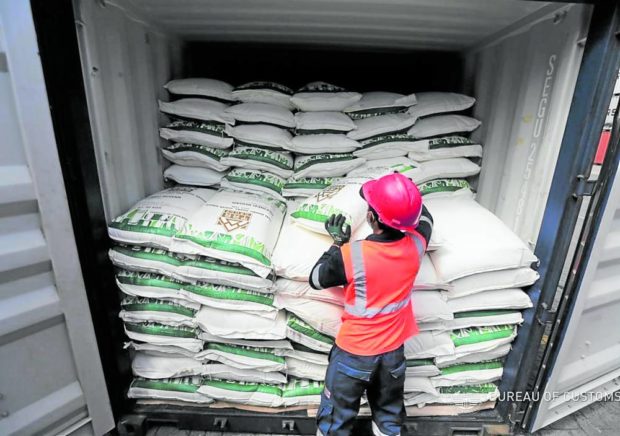
SMUGGLED SUGAR | Customs seizes P228 million worth of refined sugar last October from Thailand after its consignee failed to show an import clearance. (Photo from the Facebook page of the Bureau of Customs)
BACOLOD CITY, Negros Occidental, Philippines — Sugar industry leaders on Sunday appealed to the government to explain its plan to import 450,000 metric tons (MT) of refined sugar, including the timing of the importation to protect the domestic sugar industry.
Former Sugar Regulatory Administration (SRA) official Aurelio Gerardo Valderrama Jr., president of the Confederation of Sugarcane Producers Association (Confed), urged the SRA to reduce the import volume.
In a letter dated Jan. 27, Confed asked the SRA to stagger the volume of importation and schedule its arrival wisely so that it would not adversely affect the millgate sugar prices at the tail-end of the current milling season.
The federation’s letter was in response to the SRA’s request for comments on the appeal of the carbonated soft drinks industry, represented by Coca-Cola, Pepsi-Cola, and RC Cola, to be allowed to import sugar.
In a letter dated Jan. 6, the industry informed President Ferdinand Marcos Jr. that their sugar inventory would last only until the second quarter of 2023 and that endangered their continued operations.
But three industry groups — Confed, National Federation of Sugarcane Planters (NFSP), and Panay Federation of Sugarcane Farmers — asked the SRA and the soda makers to provide specific data to justify the request.
2-month buffer stock
The SRA officials could not be reached for comment on Sunday.
Marcos recently stated that the country needed a two-month buffer stock to ensure a sufficient sugar supply and stabilize retail prices.
The president later cited 450,000 MT as the proposed volume for importation, which was met with skepticism by most sugarcane farmers.
On Friday, labor leaders and their allies signed a manifesto opposing the importation because it would result in “grave and irreparable injury” to the sugar industry.
The Confed urged the SRA to institutionalize an orderly sugar policy mechanism by establishing “trigger points (determined through timely assessment of consumption versus supply trends) that would signal the need for consultations with the industry to determine the appropriate sugar policy at any given time.”
Manuel Lamata, president of the United Sugar Producers Federation, sympathized with the labor groups but said they should also consider the consumers who have been paying unusually high sugar prices.
Unjustified volume
Enrique Rojas of NFSP said the labor groups were not against importation, per se, but against the unjustified import volume of 450,000 MT.
“The labor group is asking for an explanation from the SRA officials why they made a complete turnaround in supporting the 450,000 MT proposed importation now when they are the same people who opposed the 200,000 MT and 300,000 MT proposed importations last year,” he said.
The sugar industry said last year that commodity prices would go down after the Christmas season, but prices have remained high. The government is also battling rising inflation.
“NFSP remains consistent in our position that the importation should be only for the specific volume needed for the buffer stock, and it should arrive in several properly scheduled tranches after the milling season,” Rojas said.